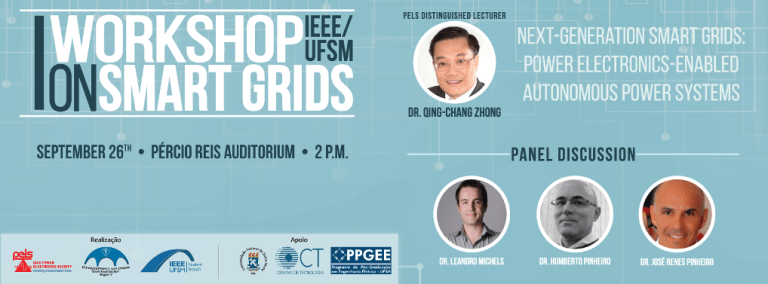Next-Generation Smart Grids: Power Electronics – Enabled Autonomous Power Systems
September 26th, 2016 – Pércio Reis Auditorium of the Center of Technology
Agenda
| Time | Activity |
| 14:00 | Opening Ceremony |
| 14:30 | Invited Speaker: Dr. Qing-Chang Zhong |
| 16:00 | Break |
| 16:30 | Panel Discussion |
Invited Speaker
Dr. Qing-Chang Zhong holds the Max McGraw Endowed Chair Professor of Energy and Power Engineering at Illinois Institute of Technology, Chicago, USA. He was educated at Imperial College London (Ph.D., 2004, awarded the Best Doctoral Thesis Prize), Shanghai Jiao Tong University (Ph.D., 2000), Hunan University (MSc, 1997), and Hunan Institute of Engineering (Diploma, 1990). As one of the few researchers in the world who is well established in both control and power engineering, he is a Distinguished Lecturer of both IEEE Control Systems Society and IEEE Power Electronics Society, and serves as an Associate Editor for seven flagship journals in control and power engineering, including IEEE Trans. on Automatic Control, IEEE Transactions on Control Systems Technology, IEEE Trans. on Power Electronics and IEEE Trans. on Industrial Electronics. Having previously held positions in the UK, Israel, and China, he is truly globalized. Before joining Illinois Institute of Technology, he was the Chair Professor in Control and Systems Engineering at The University of Sheffield, UK, where he built up a multi-million-pounds research lab and attracted the support of Rolls-Royce, National Instruments, Texas Instruments, Siemens, ALSTOM, Turbo Power Systems, Chroma, Yokogawa, OPAL-RT and other organizations. His current research focuses on advanced control theory, power electronics and the seamless integration of both to address fundamental challenges in energy and power systems.
Abstract: Power systems are going through a paradigm change. The centralized large facilities are being replaced by millions of widely dispersed relatively small renewable or alternative power plants, plug-in EVs, and energy storage units. Moreover, the majority of loads are expected to actively take part in the grid regulation in the same way as suppliers do. These bring unprecedented challenges to the operation of power systems. In this lecture, it will be shown at first that the fundamental challenge behind this paradigm change is that future power systems will be power electronics-based, instead of electric machines-based, with millions of heterogeneous players. Then, the system architecture, together with a technical route, will be presented to enable this paradigm change. It will be shown that the synchronization mechanism of conventional synchronous machines, which has underpinned the power systems for over 100 years, will continue playing its fundamental role in power systems. All power electronics-interfaced suppliers and loads can be controlled to behave like virtual synchronous machines so that they all take part in the regulation of system frequency and voltage, in the same way as conventional synchronous machines do. This will also release the communication infrastructure from low-level control and open up the prospect of achieving autonomous operation for power systems. Moreover, it will be shown that the phase-locked loops that have deemed to be indispensable for grid-tied converters can actually be removed. At the end, a brief overview of other research activities in control and power electronics will be presented.


